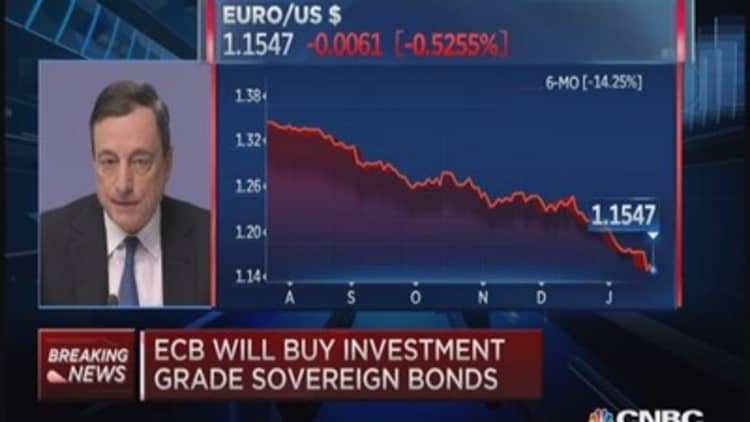The European Central Bank's (ECB) bold bond-buying scheme is set to provide a temporary boost to Asian equities but is no game changer for the region's markets, say analysts.
After months of speculation, the ECB on Thursday pledged to buy 60 billion euros ($70 billion) worth of private and public bonds each month until September 2016 in a program that could amount to 1.1 trillion euros.
This was more aggressive than the 50 billion euros in monthly asset purchases analysts expected. Investors applauded the move, sending European and U.S. equities higher overnight.
The positive sentiment carried over into the Asian trading session on Wednesday, with South Korea's KOSPI rising 0.8 percent and Indonesia's Jakarta Composite up 1 percent. But, analysts expect the lift will be short-lived.
"I doubt the increased liquidity will be driving a lot of fund inflows into Asia [over the medium-term]," Stephen Sheung, head of investment strategy at SHK Private told CNBC.

"A lot of that amount of money will likely be stuck in European banking system rather than flowing out," he said.
Funds that do flow out are likely to go into the U.S. or U.S. dollar assets instead of Asian stocks, Sheung said, citing deteriorating growth in the region.
Read MoreWhat ECB QE meansfor US policy, stocks: Strategist
"We have growth problems here in Asia, U.S. economic conditions are on a much more stable footing, and there are prospects for further U.S. dollar appreciation," he said.
Nicholas Ferres, investment director at Eastspring Investments points out that the ECB's action may have negative implications for European demand for Asian goods, due to the weakening euro. This does not bode well for Asian exporters.
"[On the negative side], the weaker euro reduces the purchasing power of the Europeans and therefore their ability to import from Asia," Ferres said. The euro sank to a more than 11-year low against the dollar and a three-month low against the yen on Thursday following the ECB's announcement.
"On the positive side, it will likely improve risk perceptions and risk appetite and that might help cheap cyclical stocks rally," he said.
More than liquidity finding its way into Asia markets, Sheung says the ECB action is likely to drive Asian intuitional investors and large corporations to make investments in Europe.
"With liquidly abundant and the euro cheaper, it makes investments more attractive," he said.
"Asian investors won't necessarily look at equities or debt but more at direct investments in projects or infrastructure. This has been a hot topic for the past two to three quarters."


